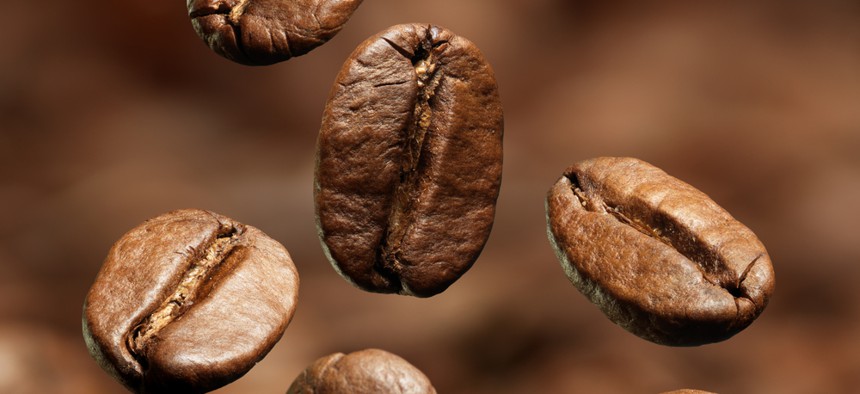
Image via Tischenko Irina/Shutterstock.com
How Much is Too Much Caffeine?
Time to ease off the coffee, lest you begin hallucinating.

Greatist is the fastest-growing fitness, health and happiness media start-up. Check out more wellness news at Greatist.com.
Pick any American at random, and odds are that person had caffeine today. One study found 98 percent of people in North America consume some kind of caffeine every day. Caffeine is a natural stimulant that comes in all shapes and sizes, including coffee, tea, chocolate, soda, and energy drinks. Moderate doses — about 200 mg, or two cups of (strong) coffee – can increase alertness, fight off headaches, and may even help prevent Alzheimer’s and other diseases. But more than 500 mg per day can lead to addiction, anxiety, irritability, and hallucinations. Get the facts before drinking that eighth cup o’ Joe.
Buzzing to Know - Why it Matters
Caffeine is the most widely used psychoactive stimulant in the world. Stimulants (a class of drugs that also includes tobacco and cocaine) target the central nervous system and affect the brain, creating a feeling of alertness. Five cups of coffee can cause a caffeine overdose, but it’s pretty difficult to get too much caffeine from something like soda or chocolate — to hit 500 mg a day, a person would need to consume 14 cans of Diet Coke or five cups of chocolate chips. But just a little more than two 5-Hour Energy drinks can put someone in the caffeine danger zone.
Consuming too much caffeine in one day can exacerbate or induce psychiatric conditions such as panic attacks, psychosis, and mania. And lay off the caffeine benders — long bouts of caffeine-induced insomnia have even led to acute suicidal thoughts or death in some cases. That fifth vodka Red Bull might not be the best choice either, since certain symptoms of caffeine intoxication — like vomiting,cardiac arrhythmias, and high blood pressure — can get worse when combined with alcohol.
In the long term, substituting lattes for a regular sleep schedule can have some scary consequences. Consistently consuming too much caffeine over many months can lead to dependence and some rough withdrawal effects like migraines, depression and fatigue. But it’s not all doom and gloom for caffeine connoisseurs.
It’s difficult to say how much caffeine is too much because the substance can have vastly different effects depending on the person consuming it. Veteran caffeinators might laugh in the face of danger (I drink five cups a day and I’m not sick) but they may have a medical reason to do so. People naturally build up a tolerance to the effects of caffeine, meaning they need more to get the same buzz. Other factors like weight and body mass index also come into play; in general, those with a higher BMI can tolerate larger quantities of caffeine.
There’s no need to go cold-turkey on caffeine, since moderate amounts may actually have some big benefits. Five cups of coffee might be overdoing it, but one can help us power through a tough meeting by increasing alertness and improving knowledge retention. Caffeine may even help fight some diseases such as Alzheimer’s and Parkinson’s. And studies show that consuming caffeine just before exercise can improve attitude and performance.
But caffeinators worried they’ve overshot their limit can take some simple steps to recuperate, such as drinking water (to help flush the liver), resting if possible, and cutting their caffeine intake in the future. Easier said than done? Instead of using caffeine, try getting that energy boost from quick workouts or smelling lemons (really).
The Takeaway
- More than 500 mg of caffeine in one day can be dangerous (even though that number is subject to the individual).
- Potential effects of consuming too much caffeine include panic attacks, cardiac arrhythmias, and even suicidal tendencies.
- Recognize a body’s limit. Manage caffeine intake and be wary of unexpectedly caffeinated foods, such as chocolate and soft drinks.
- If you need a fix, caffeine’s fine. Just stop at the third cup.
NEXT STORY: Furloughs Begin Across Executive Branch






